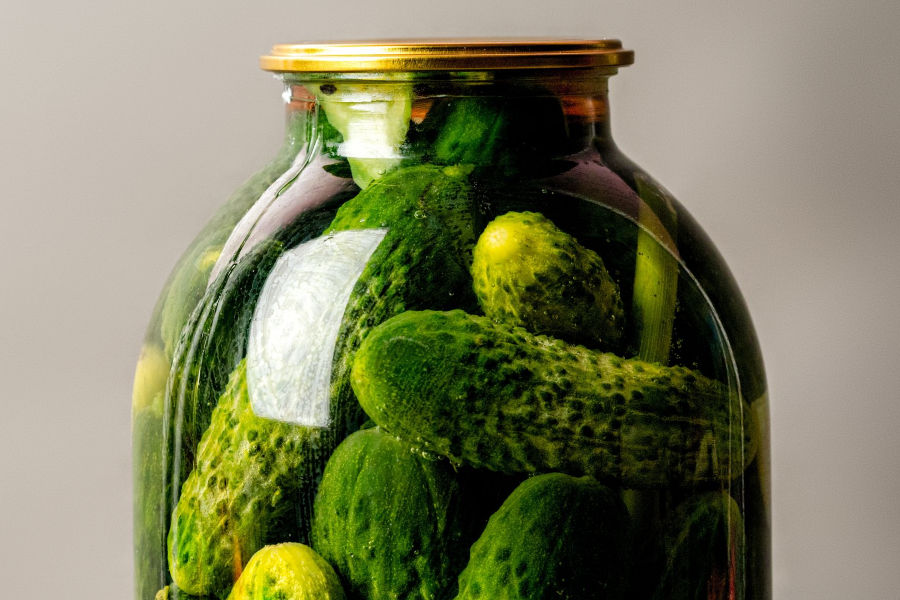Pickles are a favorite snack for humans, especially in the summertime. They’re fairly healthy and a great snack to cool us down and provide hydration. But can we share these tasty treats with our dogs?
Luckily, there are healthier options that can achieve the same goals. If you’d like your dog to enjoy a cool snack, try cucumber! If you’re looking for the health benefits of a dill pickle, consider feeding your dog fresh dill instead.
Below, we’ll dive into why pickles aren’t good for dogs, what to do if your dog eats pickles, and more.
Table of Contents:
Can Pickles Kill Dogs?
Unfortunately, there isn’t a straight answer to this. Pickles won’t usually kill a dog, but they can sometimes contain toxic ingredients.
Your typical dill pickle isn’t likely to be toxic, though it’s important to check the ingredients before feeding anything to your dog. However, they also aren’t healthy for dogs because they contain so much sodium.
Dr. Carly Fox, when interviewed by the American Kennel Club, recommended feeding fresh dill if you’d like your dog to get its health benefits without the additives that make dill pickles unhealthy.
Bread-and-butter pickles contain toxic ingredients like onion and garlic. These and sweet pickles also contain too much sugar for dogs.
There are also spicy varieties of pickle that your dog is unlikely to enjoy—and they might contain toxins on top of this.

Are Pickles Healthy for Dogs?
Pickles do have some health benefits, but it’s not recommended to feed your dog pickles. They’re extremely high in sodium and can contain toxic ingredients depending on the recipe.
Pickles also contain vinegar, which isn’t healthy for your dog and can harm their kidneys.
Some healthier alternatives include feeding your dog fresh dill or cucumber. Dill can be used to top your dog’s kibble, and you can use cucumber as treats during training or share one with your dog on a hot summer day by the pool.
How Many Pickles can a Dog Eat?
We don’t recommend purposefully feeding your dog pickles at all. But if your dog has gotten into pickles somehow, don’t panic! First, check the ingredients.
If there are no toxic ingredients in the pickles such as garlic or onion, then your dog will be fine—though they might get an upset stomach if they’ve eaten enough of them.
If the pickles do contain toxic ingredients, contact your closest emergency veterinarian or the pet poison hotline at (855) 764-7661.
While dogs sometimes suffer no consequence from eating toxic foods, especially in small amounts, it’s better to be safe than sorry.
The veterinarian professional you contact can walk you through your next steps, which may involve inducing vomiting to get the toxins out of your dog’s system. This will prevent symptoms of poisoning from taking effect, so it’s super important to act early!

Can Dogs Eat Pickle Juice?
No, dogs should not have pickle juice. Just like with pickles, the juice may contain toxic ingredients like onion or garlic. It also contains a lot of salt, which isn’t good for your dog.
If you’re looking for something healthy and tasty for your dog to drink, try a plain, sodium-free chicken broth. You can also use it to moisten their kibble, giving it extra flavor, hydration, and nutrients.
If you’re trying to prevent waste by feeding your dog pickle juice, consider re-using it to make more pickles instead. All you’ll need is a fresh cucumber—or even another veggie to pickle.
You can also try using it to make a delicious potato or tuna salad for yourself to eat.
Can Dogs have Cucumbers?
Yes, dogs can have cucumbers. We recommend giving your dog small amounts of fresh cucumber as a tasty snack or treat.
First, wash the cucumber with water to remove pesticides. Then, cut the cucumber into thin slices. Small pups might need your average slice cut into four or more pieces.
I recommend at least cutting each slice in half to reduce your dog’s risk of choking since cucumber slices are round.
Never give your dog a whole cucumber. While they might enjoy gnawing on it, the chances of them choking is increased.
Cucumbers are a fantastic snack in the summertime to cool and hydrate your dog. Unlike pickles, they’re low in salt. They also contain little fat or sugar.
Remember that, while cucumbers are healthy, no treat should make up more than 10% of your dog’s diet. I recommend beginning by giving your dog small amounts of cucumber to allow their digestive system to get used to the new food.
After that, your dog can have as many as you’d like to feed them—so long as they don’t go over that 10% threshold.
See previous articles to learn if dogs can eat shrimp, cherries, nuts, and more pet health questions!












